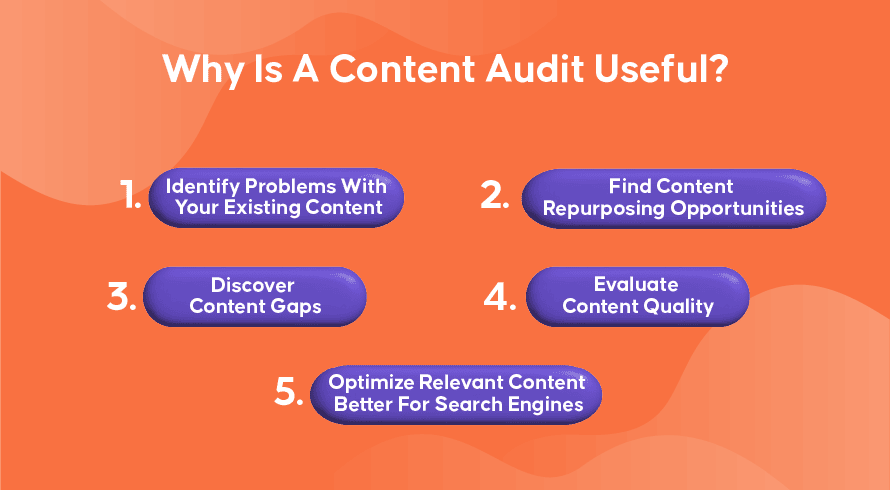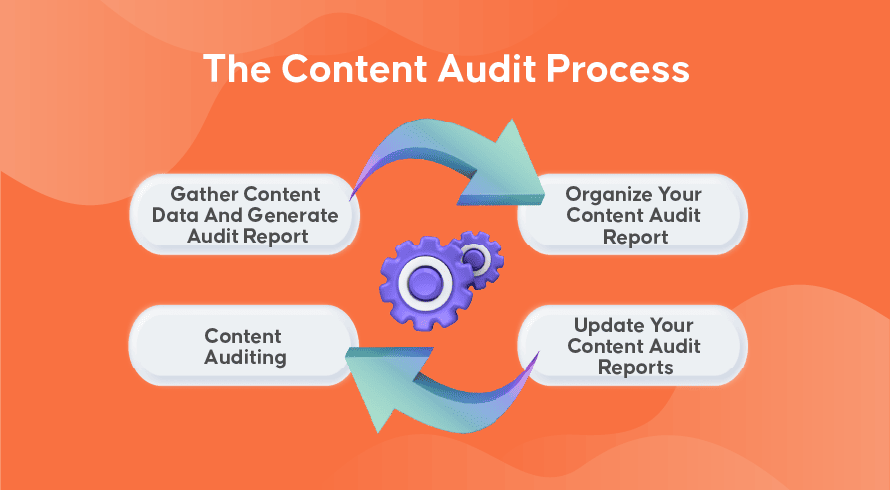Inquivix HQ
1-903, 18 Eonju-ro 146-gil,
Gangnam-gu, Seoul, Korea
06057

If you’ve been wondering ‘Why is a content audit useful?’, then you’ve come to the right place. We’ll tell you just what a content audit is, why it’s an important part of any business’s content strategy, and how a basic content audit process works. We’ll also go through a few SEO tools that can help you perform your content audits to make sure that everything is properly optimized during future content creation for your business website.
What Is An SEO Content Audit?

The content on your web pages can be extremely valuable to turn a website visitor into a paying customer and nudge them along the sales funnel. For these conversions to happen smoothly, the content on your website has to contain relevant information and be useful to the reader. If these are landing pages for your products, they should communicate clearly and convincingly why the reader needs your product or service. If it’s a blog post or a video, it can answer questions that potential customers might have and address their pain points.
It helps if you have writers capable of creating content that can impress the reader with your company’s expertise in your industry niche. And of course, it goes without saying that the content cannot be plagiarized, or outdated content. To bring in more organic traffic to your website content, you can also utilize on-page search engine optimization (on-page SEO) techniques.
Keyword research can help you identify heavily used search terms, which can be strategically included in the copy of your content along with internal links, and outbound links. In time, as Google recognizes the relevance of your content and your website’s authority, it will get pushed up in search engine rankings, bringing in more traffic. For more on keyword research, read Keyword Research – Find the Search Vernacular of Your Market.
However, you cannot simply forget about your content after it is published. An important part of content marketing is to conduct periodic content audits. A content audit is an analysis of your published content to ensure that it is of good quality, its on-page SEO performance is satisfactory, and that it is being presented to your target audience properly. It also allows you to check if your current content strategy is properly aligned to help you achieve your business goals, and identify areas that require improvement.
Why Is A Content Audit Useful?
A content audit helps digital marketing teams get a clear picture of how web content is performing, what issues exist, what can be done to bring in more organic traffic, and how to improve the buyer’s journey and increase conversion rates. A content audit can also give writers fresh ideas for new content, and increase brand awareness as more and more people recognize your website as a valuable source of engaging content. Let’s dive into the benefits of a content audit to find out more.

Identify Problems With Your Existing Content
The first thing a content audit will allow you to do is to identify any performance issues like slow loading, and broken links that might frustrate your site visitors with a less than satisfactory user experience. A content audit can also give you a better idea of whether your site architecture needs to be organized better to make it easier for search engines to index it.
A fast-loading site that looks great on mobile devices, is functional and is easy to navigate will improve its accessibility. You have to make sure your site is appealing to both new visitors and returning customers.
Find Content Repurposing Opportunities
In content marketing, you don’t always have to be creating entirely new content pieces as long as your existing material is still up to date with the latest information, is valuable, contributes to search engine rankings, and brings in organic traffic. There are opportunities to repurpose this existing content in new ways.
For example, if you have a great blog post that is performing well in terms of SEO, you can turn its contents into infographics or make a YouTube explainer video that can be shared on your social media pages. The content audit can help you find these content pieces that are performing exceptionally well, allowing you to generate new types of content that will help your business grow.
Discover Content Gaps
Gaps exist in your content that your audience might be interested in reading. Since a content audit can make an inventory of all your current site content, it will highlight places that are lacking in information. You can then get your writers to create new blogs for these topics or fill in the missing pages. This can be a bit time-consuming, but it can help you build your business site into a valuable resource for your audience which will keep them coming back for more engaging content.

Evaluate Content Quality
A content audit of your site will reveal the quality of your published content. Is the copy too lengthy or too short? Is it too repetitive, or contain too many grammatical errors? The search engine crawlers used by Google are capable of determining the quality of your content. If they deem it inferior compared to your competitors, they will lower your search rankings.
If you want more organic traffic to be directed at your site, then you have to look at the results of your content audit and improve the quality of the content on your pages. For more on how search crawlers work, read What Technology Do Search Engines Use To Crawl Websites?
Optimize Relevant Content Better For Search Engines
You could have the best writers creating top-quality content. However, it won’t help you find an audience if they haven’t included the most relevant keywords in the copy. For new content, you should always do keyword research first using Google Search Console or other tools like SEMrush and then do the writing. For your published content, you can perform a content audit, and determine which relevant keywords can be inserted into the copy.
By doing this, you can help Google understand the relevancy of your content better the next time it crawls your site. It will then present your content in its search results, allowing it to be discovered by the people that are requesting information on the particular topic. Don’t let your best content be hidden away from your audience because you forgot to do the keyword research properly the first time. Use an audit and find ways to make it discoverable on search results.
How The Content Audit Process Works
Now let’s take a look at how you can conduct your content audit, and what SEO tools can be used to handle this process.

Gather Website Content Data Using On-Page SEO Tools
The first step in a content audit is to collect all your site content and make an inventory of it. This doesn’t mean you have to go from your first page to the last individually and collect information on them. Many SEO tools can help you do this, including Google Analytics, and online services such as SEMrush, Ahrefs, Moz, and more.
These tools will effectively crawl your website page by page, collect URLs, analyze every bit of content that’s on it, and present you with a content audit report. These tools are so powerful that you might discover old pages that you forgot you even had. Some SEO content audit software will notify you regarding issues and might even include recommendations on how to resolve them. Some services like SEMrush can even do a backlink audit, allowing you to discover toxic backlinks that can harm your site’s reputation online.
Organize Your Content Audit Report
If you’re handling the website on your own, you could get to work immediately on fixing these issues. However, as a best practice, it’s best to save the content audit report you generated as Excel or Google Sheets. This will help you keep track of each audit you performed, and share the relevant information with the people tasked with solving technical site issues or rewriting content.
The content audit report will include data like the list of URLs, the metadata for each page, H1s (titles), links, keywords, traffic, and whatever other data points your software will be able to obtain. After saving this in your spreadsheet, you can create new columns to give more context such as content type, the purpose of content, and even the stage of the buyer’s journey. This will help all relevant stakeholders from your web developers to content writers to understand what your business goals are.
Analyze Your Report (Content Auditing)
The next step is to analyze your report and determine what you can do to improve your content. Some pages will have missing columns for the metadata, while other pages might have links that no longer work properly. You could find underperforming content and figure out what the reasons are, from missing keywords to not having enough word count to be deemed useful for readers.

Many SEO auditing tools will indicate these issues in their reports, making it easier for you to understand what exactly the problem is. These tools also come with the ability to compare your content with your competitors, allowing you to discover keyword gaps that can be filled in the future using fresh content.
After analyzing the data, you can add more columns to indicate what the next course of action is and who will be responsible for taking action. You can also prioritize tasks based on their level of urgency. For example, a website loading issue or a broken link to an important page needs to be fixed quickly. This will ensure your entire team is focused as they get to work.
Keep Updating Your Content Audits
Once you understand how the process works, it’s important to keep doing regular audits, and keeping your reports up to date. You should keep track of which issues have been resolved, and which need to be fixed next. This will keep your entire team on the right track, and help you achieve your business objectives.
Want To Do A Website Content Audit?
If you’re unsure of how to utilize on-page SEO auditing tools or how to analyze the data you gather from them, your best option is to find an SEO specialist who knows how to do it for you. It just so happens that Inquivix is fully capable of delivering on this. We can conduct a content audit, determine what needs to be fixed, and provide you with recommendations on how to improve your content strategy in the future.
In time, you will find that your site will receive more traffic, generate more leads, and increase your conversions. To learn what else we can do for you, visit Inquivix today!
FAQs
In today’s digital world, content creation has become so common that there are millions of content getting uploaded every day. But what sets apart quality content is its purpose. There are four main purposes of good content – to entertain, to inspire, to educate, and to convince. If your content meets these four criteria, you have a better chance of attracting your potential audience. If you do
A content audit will reveal which content topics you’re currently missing, which content types your audience finds engaging, and whether your content is up to the expected standard of quality.
Missing metadata, poor content quality, repetitive content, bad links, and content that is too short or too long are just some of the issues revealed in a content audit.
